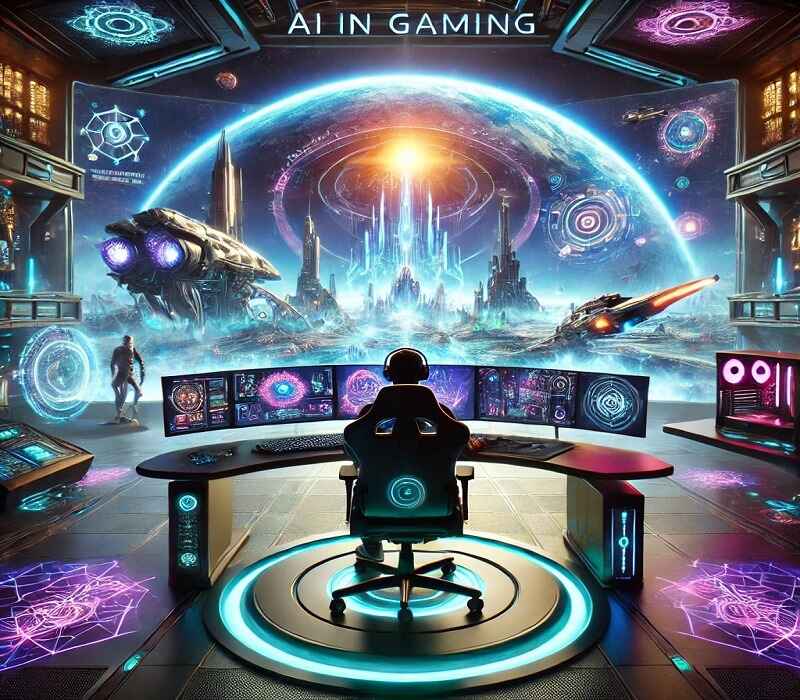
Artificial Intelligence (AI) has already made a significant impact on the gaming industry, but its potential is far from fully realized. As technology continues to evolve, AI is set to revolutionize how games are designed, played, and experienced. This article explores the future of AI in gaming, covering its potential applications, benefits, challenges, and answering frequently asked questions. By the end, you’ll have a clear understanding of how AI will shape the gaming landscape in the years to come.
1. Introduction to AI in Gaming
AI in gaming refers to the use of artificial intelligence technologies to enhance game design, gameplay, and player experiences. From creating smarter non-player characters (NPCs) to generating vast, dynamic worlds, AI is already transforming how games are made and played. However, the future holds even more exciting possibilities, as AI continues to advance and integrate with other emerging technologies like cloud computing and virtual reality.
2. Current Applications of AI in Gaming
Before diving into the future, let’s look at how AI is currently used in gaming:
| Application | Description | Examples |
|---|---|---|
| Smarter NPCs | NPCs can follow basic commands and react to player actions. | Enemies in Call of Duty |
| Procedural Generation | AI creates random maps, levels, or quests. | Worlds in Minecraft |
| Adaptive Difficulty | Games adjust difficulty based on player performance. | Left 4 Dead’s AI Director |
| Player Behavior Analysis | AI studies player habits to improve game design. | Fortnite’s matchmaking system |
| Voice and Speech Recognition | AI enables voice-controlled gameplay and interactions. | Tom Clancy’s Rainbow Six Siege |
These applications are just the beginning. As AI technology improves, its role in gaming will become even more significant.
3. The Future of AI in Gaming
3.1 Hyper-Realistic NPCs
In the future, NPCs will become more lifelike than ever. They’ll have emotions, memories, and the ability to learn from player interactions. For example, an NPC might remember if you helped them in the past and act differently toward you because of it. This will make games feel more immersive and dynamic.
Example: Imagine playing a role-playing game where an NPC merchant remembers your previous purchases and offers personalized discounts or items based on your preferences.
3.2 Procedural Content Generation
AI will take procedural generation to the next level by creating entire worlds, quests, and stories on the fly. These worlds will be unique for every player, ensuring no two gaming experiences are the same.
Example: A fantasy game could generate a sprawling, detailed world with custom quests and challenges tailored to your playstyle.
3.3 Adaptive Gameplay
AI will analyze your gameplay in real-time and adjust the game to suit your skill level and preferences. If you enjoy puzzles, the game might introduce more brain teasers. If you prefer action, it might ramp up the battles.
Example: A horror game could adjust its scare tactics based on how you react to certain situations, ensuring you’re always on the edge of your seat.
3.4 AI-Driven Game Development
AI will assist developers by automating tasks like character design, level creation, and bug testing. This will reduce development time and costs, allowing studios to focus on creativity and innovation.
Example: An AI tool could generate hundreds of character designs in minutes, giving developers more options to choose from.
3.5 Virtual Companions
AI-powered companions will enhance immersion by guiding players, providing hints, or even engaging in meaningful conversations. These companions will feel like real friends, making the gaming experience more interactive and enjoyable.
Example: In an open-world game, an AI companion could help you navigate the map, share stories, or fight alongside you in battles.
3.6 Ethical and Emotional Storytelling
Future games will tackle complex moral dilemmas and evoke deeper emotional responses from players. AI will create stories that challenge your values and make you think about right and wrong.
Example: A game might present you with a difficult choice, like sacrificing one character to save many others, and explore the consequences of your decision.
3.7 Cloud Gaming and AI Integration
Cloud gaming allows players to stream games over the internet without needing powerful hardware. In the future, AI will work with cloud gaming to create massive, detailed worlds that can be accessed from anywhere.
Example: A multiplayer game could use AI to simulate realistic weather patterns or create dynamic events that affect all players simultaneously.
4. Benefits of AI in Gaming
| Benefit | Description |
|---|---|
| Personalized Experiences | AI tailors games to individual players, making them more engaging. |
| Faster Development | AI automates tasks, reducing development time and costs. |
| Endless Content | Procedural generation ensures players always have something new to explore. |
| Improved Immersion | Realistic NPCs and dynamic worlds make games feel more alive. |
| Accessibility | AI can adapt games for players with disabilities, making gaming more inclusive. |
5. Challenges and Concerns
While the future of AI in gaming is exciting, there are some challenges to address:
| Challenge | Description |
|---|---|
| Ethical Concerns | How should AI handle sensitive topics like violence or discrimination? |
| Data Privacy | AI needs data to learn, but players’ information must be protected. |
| Cost | Developing advanced AI systems can be expensive. |
| Job Displacement | AI could automate tasks traditionally done by humans, leading to job losses. |
| Over-Reliance on AI | Games might lose their creative touch if AI is overused. |
6. FAQs About AI in Gaming
Q1: Will AI replace human game developers?
A: No, AI will assist developers but not replace them. Humans are still needed for creativity and storytelling.
Q2: Can AI make games too hard or too easy?
A: AI will adjust the difficulty based on your skill level, so games should always feel challenging but fair.
Q3: Will AI make games less creative?
A: Actually, AI can boost creativity by generating new ideas and content that humans might not think of.
Q4: Is AI in gaming expensive?
A: Right now, AI can be costly, but as technology improves, it will become more affordable for game studios.
Q5: Can AI create entire games on its own?
A: Not yet. While AI can help with parts of game development, creating a full game still requires human input.
7. Conclusion
The future of AI in gaming is incredibly promising. From hyper-realistic NPCs to endless, dynamically generated worlds, AI will make games more immersive, personalized, and engaging. While there are challenges to overcome, the potential benefits far outweigh the risks. As technology continues to advance, AI will play an increasingly important role in shaping the games of tomorrow.
What are your thoughts on AI in gaming? Do you think it will enhance or detract from the gaming experience? Share your opinions in the comments below!
for more articles, visit our website : https://topmate.blog/






